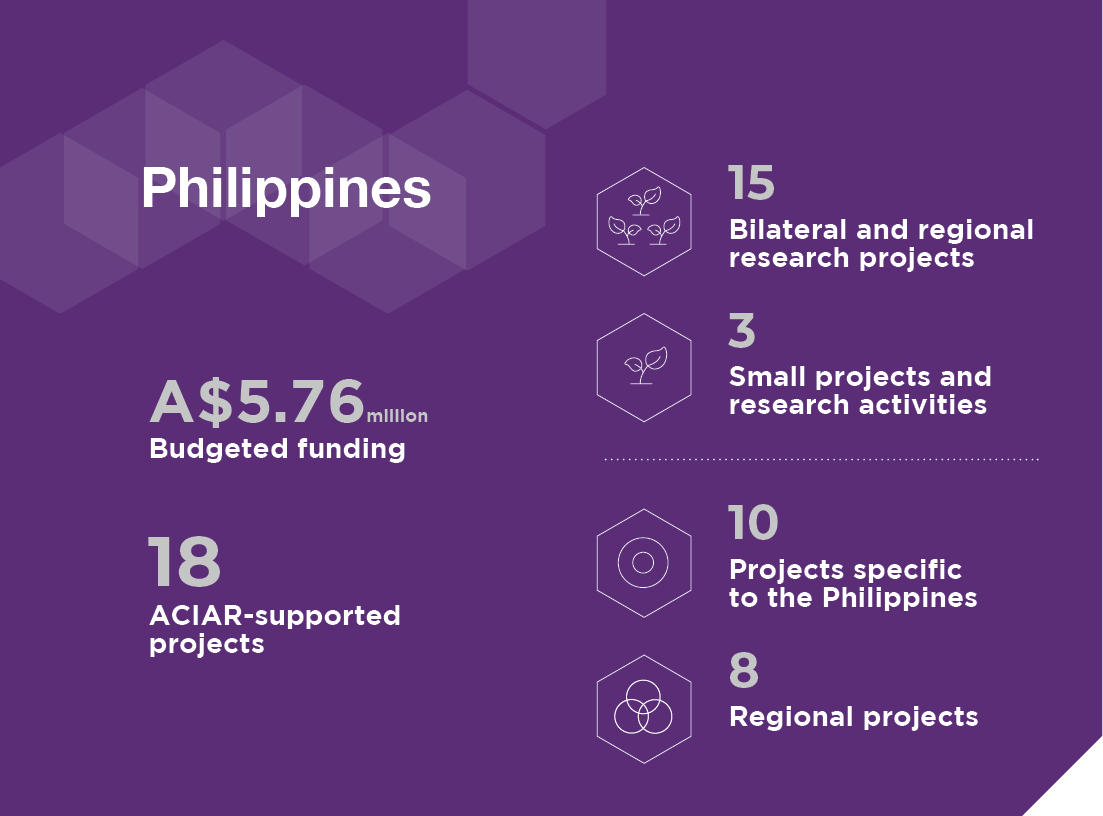The Philippine economy continues to recover from the impact of the COVID-19 pandemic and from significant disasters (super typhoons and volcanic eruptions) in previous years. The Philippine economy grew by 7.6% in 2022, a significant turnaround from the contraction of GDP of 9.5% in 2020.
The agriculture, fisheries and forestry sectors contributed about 9% of GDP but growth remained slow at 0.5%. According to various studies, previous land reform policies have reduced average farm size by 34% and agricultural productivity by 17%. Furthermore, the lingering zoonotic diseases (such as African swine fever and highly pathogenic avian influenza), plant diseases and natural disasters continue to create challenges for the sector. Food insecurity remains a significant issue for the poorest and most vulnerable. The overall hunger rate was more than 11% in 2022, and food prices continue to rise.
The current Philippines Government, elected in 2022, has identified agriculture as its key priority and is focusing on modernisation of agrifood systems to increase agricultural productivity, improve resilience to climate change impacts and ensure food security. Experts recommend that in order to achieve these goals, there needs to be significant improvements in the business environment and increased support to agricultural research and development to boost long-term productivity. This provides strategic opportunities for ACIAR to co-invest in research partnerships for mutual benefits. It is anticipated that research-for-development investments will positively impact smallholder farming and fishing communities through innovations and science-based approaches.
The Philippines is one of Australia’s longest-standing bilateral partners, celebrating 77 years of diplomatic relationship in 2023. Bilateral cooperation is underpinned by the Philippines–Australia General Agreement on Development Cooperation and guided by the Memorandum of Understanding on Scientific and Technical Cooperation (2009) and Record of Partnering Arrangements (2018). The Department of Science and Technology–Philippine Council for Agriculture, Aquatic and Natural Resources Research and Development (DOST–PCAARRD) is a bilateral partner of ACIAR. The partnership between DOST–PCAARRD and ACIAR is comprehensive and strategic, characterised by joint decision-making on research priorities, co-development and co-investments in research and capacity-building projects and continuous knowledge exchange.
The Philippines takes a whole-of-government approach to research and development through its Harmonised National Research and Development Agenda in Agriculture, Aquatic and Natural Resources Sector, for which DOST–PCAARRD has oversight. To systematise research and development investments and decentralise implementation, DOST–PCAARRD established Regional Consortia, composed of government agencies, state universities and research institutions across the country. ACIAR works within these established systems to maximise effectiveness, efficiency, coherence, relevance, sustainability and impact of its investments in the Philippines. ACIAR and DOST–PCAARRD together prioritise research areas where Australia’s expertise complements and adds value to existing in-country expertise.
Country priorities
ACIAR in the Philippines aims to contribute to improvements in productivity, competitiveness and sustainability of agrifood systems for human, environmental and economic resilience through research and capacity-building programs. We envision a future where the Philippines has well-functioning agrifood systems, more Filipinos (especially the poor) have better access to safe and nutritious food, and smallholder farmers, fishers and their communities have sustainable livelihoods.
In 2020, ACIAR examined food systems in the Philippines to identify vulnerabilities exposed or amplified by the COVID-19 pandemic. This information, published in ACIAR Technical Report 96, COVID-19 and food systems in the Indo-Pacific: an assessment of vulnerabilities, impacts and opportunities for action, as well as outcomes from subsequent annual partnership health checks with DOST–PCAARRD, affirmed the relevance of the following country priorities:
- improved agrifood production systems, through science, technology and innovation
- more competitive agricultural products in the market
- improved returns from livestock systems
- sustainable fisheries and aquaculture production
- improved land and water resources management for profitable and sustainable agriculture
- improved resilience to climate change and other natural shocks
- Improved technology adoption through social system analysis and community-based approaches, facilitated extension services, and policy advocacy.
Capacity-building activities amplify the impact of research programs. ACIAR offers many opportunities for capacity building, including the John Allwright Fellowship, the John Dillon Fellowship, the Meryl William Fellowship, and more recently, the John Allwright Fellowship–Philippines, which is a pilot of the first ACIAR–DOST co-funded scholarship program. These programs enable researchers and scientists to gain credentials from Australian universities and enhance their leadership skills and career opportunities. Additionally, ACIAR supported the first Agribusiness Master Class in the Philippines, which successfully brought together a cohort of researchers, academics, farmer leaders and representatives from the private sector to collaborate. This has now been integrated as a regular course offering of the DOST–PCAARRD Agri-Aqua Hub.
Graduates of all these programs are considered ACIAR alumni. ACIAR provides continuing support to alumni for continuous learning, networking and access to research funds. In the Philippines, ACIAR supported the establishment of the Agriculture, Aquatic and Natural Resources Community of Practice as part of the Australia Alumni Communities Philippines and the Global Australian Alumni network. This has resulted in a more systematic and sustainable approach to alumni engagement and provides a formal mechanism for the Philippine Government and leaders from private and not-for-profit sectors to access alumni expertise on critical development issues.
Outreach and communications are increasingly important as a means to strengthen understanding and awareness of the impact of our projects as part of Australia’s aid program in the Philippines. Our initiatives aim to support and strengthen relationships among in-country project partners and stakeholders, and to share knowledge generated from ACIAR-supported research programs with the public and with policymakers.
2023–24 research program
The research program addresses our high-level objectives, as outlined in the ACIAR 10-Year Strategy 2018–2027, as well as specific issues and opportunities identified by ACIAR and our partner organisations.
The following table lists ACIAR-supported projects active in the Philippines during 2023–24.
Current and proposed projects in the Philippines, 2023–24

